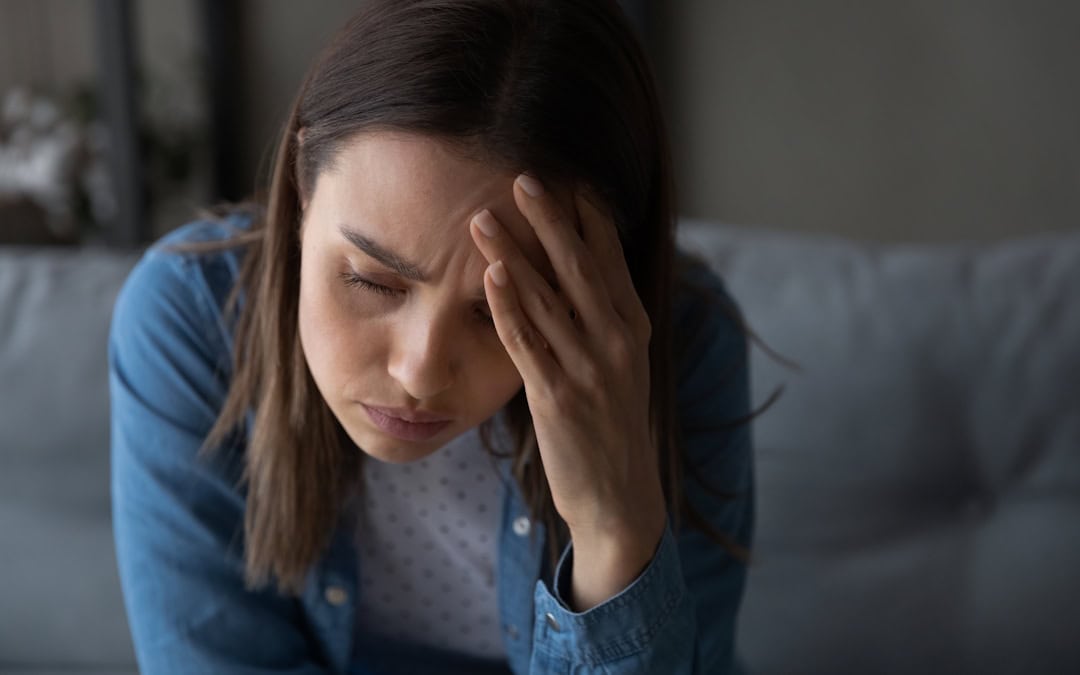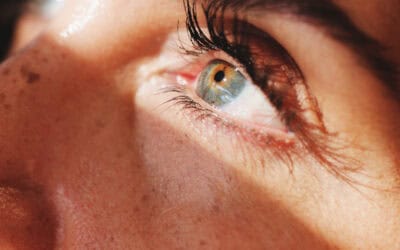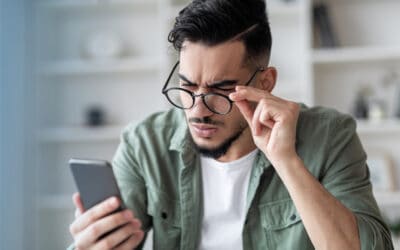Your vision can suffer from stress in unexpected ways. Further compounding the issue is that nearly one in three Americans spend more than seven hours looking at screens each day, making stress-related eye problems even worse.
Not only does your body’s stress response affect your sleep or digestion but your eyes also bear the brunt of this physical and emotional reaction. When stress hormones flood your system, they trigger changes throughout your visual system that can lead to both immediate discomfort and long-term vision threats.
The connection between stress and vision problems runs deeper than most people understand.
Hundreds of studies reveal that stress increases your risk of vision loss from serious conditions like glaucoma and age-related macular degeneration. Common stress-related vision issues include blurred vision, eye strain, excessive tearing, light sensitivity, and eye twitching. While stress doesn’t directly cause the most common form of glaucoma, chronic stress can accelerate the development of various eye diseases.
With approximately 285 million people worldwide living with visual impairment, recognizing how your mental state impacts your eyesight becomes critical for protecting your vision. Your eyes deserve protection from stress just as much as they need protection from injury or disease.
This article reveals the surprising ways stress affects your vision, warning signs you shouldn’t ignore, and proven strategies to protect your eyesight when life gets overwhelming. Understanding the stress-vision connection could make the difference between maintaining healthy sight and facing preventable vision problems.
Your Body’s Stress Response and Your Eyes
When stress strikes, your body launches an immediate defense system that directly targets your visual system. Your “fight or flight” response floods your bloodstream with hormones like cortisol and adrenaline, preparing you for perceived threats. These powerful chemicals not only affect your heart rate and breathing but they also create a cascade of changes that impact every structure in your eyes.
Your pupils dilate instantly during stress, allowing more light to enter so you can better detect potential dangers. At the same time, stress hormones constrict the blood vessels in and around your eyes, potentially reducing vital blood flow. This vascular constriction often triggers headaches, blurred vision, and that familiar feeling of eye strain.
Cortisol is particularly problematic for your eye health. This stress hormone increases inflammation in delicate eye tissues, setting the stage for dry eye, conjunctivitis, and blepharitis. Even more concerning, prolonged stress can elevate intraocular pressure (IOP), significantly increasing your risk for developing glaucoma.
Physical changes you can feel
The muscles surrounding your eyes tense up during stressful periods, often resulting in eye twitching, soreness, and myokymia—that annoying uncontrollable eyelid spasm. These aren’t just minor irritations; they signal that chronic stress may be impairing the autoregulation and vascular function of your retinal blood vessels.
Research reveals that stress contributes to serious conditions like central serous chorioretinopathy (CSC), where fluid leaks into the macula, causing blurred central vision. Your blink rate also decreases during stress, leaving your eyes without adequate moisture and leading to dry eye problems.
Perhaps most surprisingly, heightened cortisol levels can temporarily alter your eye’s focusing ability, creating moments of blurred vision or difficulty with visual clarity. These focusing problems often appear without warning, making everyday tasks suddenly challenging.
The good news: Understanding these stress-vision connections helps you recognize when your eyes need protection and care.
Warning Signs Your Eyes Are Telling You About Stress
Early recognition of stress-related vision problems can prevent more serious complications from developing. Dry eyes affect as much as 8% of the U.S. population and often show up as burning, redness, irritation, watery eyes, and blurred vision.
Your eyes might start feeling unusually sensitive to light, making it uncomfortable to work under normal lighting or step outside on bright days. Eye twitching (myokymia) represents one of the most common early warning signs being those uncontrollable eyelid spasms that seem to worsen during stressful periods, especially when you’ve had too much caffeine or too little sleep.
Visual disturbances can appear suddenly during anxious episodes. Eye floaters—those spots or squiggly lines drifting across your vision—may become more noticeable when stress levels spike. Temporary blurred vision often occurs through several mechanisms, including increased eye pressure and reduced blinking that naturally happens when you’re concentrating intensely.
Watch for these additional warning signs:
- Tunnel vision or narrowed peripheral vision during high-stress situations
- Eyes that swing between excessive tearing and extreme dryness
- Eye strain that comes with headaches, particularly after long work sessions
- Double vision that appears after extended periods of focus
Remember that persistent symptoms deserve attention before they worsen.
When stress-related vision symptoms persist or interfere with your daily activities, schedule a comprehensive eye exam at Chang Eye Group in Pittsburgh. Catching these problems early often means the difference between simple management strategies versus more serious interventions later on.
Protecting Your Vision When Stress Takes Over
You don’t have to wait for stress-related vision problems to worsen before taking action. Simple daily habits can make a significant difference in protecting your eyes during stressful periods.
The 20-20-20 rule offers immediate relief for digital eye strain—every 20 minutes, look at something 20 feet away for 20 seconds. This simple practice gives your eye muscles the break they need to recover from prolonged focus. Learn more about the 20-20-20 rule and other do-it-yourself eye exercises to build long-term eye health in this article from our team at Chang Eye Group.
Proper hydration directly impacts your eye comfort. Dehydration leads to dry, irritated eyes and blurred vision, making stress symptoms feel even worse. Getting 7-9 hours of quality sleep each night allows your eyes to replenish themselves with essential moisture and nutrients.
The good news: Stress reduction techniques benefit both your mental health and your vision.
Regular exercise, deep breathing, and meditation effectively reduce cortisol levels that harm your eyes. A diet rich in vitamins A, C, E, and omega-3 fatty acids supports optimal vision during challenging times.
For immediate comfort during stressful days:
- Use artificial tears when your eyes feel dry
- Position your computer screen 20-26 inches from your face, slightly below eye level
- Adjust screen brightness to match your surroundings to minimize glare
- Blink consciously because we blink only 5-7 times per minute while using digital devices compared to the normal 15 times
These strategies work best when you implement them consistently, not just during crisis moments. Think of them as daily insurance for your vision health.
Don’t wait for symptoms to escalate.
If stress-related vision problems persist despite these self-care measures, schedule an eye exam at Chang Eye Group. Your optometrist can provide personalized treatments, from vision therapy to special lens prescriptions, that address your specific concerns.
Professional care combined with daily prevention creates the strongest defense for your eyes during life’s most stressful moments.
Protecting Your Vision When Life Gets Stressful
Your eyes send clear signals when stress begins taking its toll. Eye twitching, blurred vision, and light sensitivity aren’t just minor inconveniences, they are actually your body’s way of telling you that both your stress levels and eye health need attention.
The good news: Most stress-related vision problems respond well to simple interventions. Following the 20-20-20 rule, staying hydrated, and getting quality sleep can make a significant difference in protecting your eyes during stressful periods. Stress-reduction techniques like deep breathing and regular exercise benefit both your mental state and your visual system.
Don’t wait for symptoms to worsen before taking action.
When vision changes persist despite self-care efforts, professional evaluation becomes essential. Your eyesight is too valuable to risk through delay or neglect. Remember that stress-related eye problems can sometimes signal more serious underlying conditions that require prompt attention.
Understanding the stress-vision connection empowers you to take control of your eye health proactively. Whether you’ve noticed recent changes in your vision during stressful times or simply want to protect your eyes from stress-related damage, Chang Eye Group in Pittsburgh provides experienced eye care tailored to your specific needs.
FAQs
Q: Can anxiety affect your vision?
A: Yes, anxiety can impact your vision. It may cause symptoms like blurred vision, eye strain, and increased sensitivity to light. These effects are often temporary but can be distressing.
Q: What are the effects of stress on eyesight?
A: Stress can lead to various vision issues, including blurred vision, eye twitching, dry eyes, and light sensitivity. If left unmanaged, stress may also contribute to more serious conditions like glaucoma and age-related macular degeneration.
Q: How can I alleviate stress-related blurred vision?
A: To reduce stress-related blurred vision, try practicing relaxation techniques, following the 20-20-20 rule for screen time, staying hydrated, and ensuring adequate sleep. If symptoms persist, consult an eye care professional.
Q: What are some warning signs of stress-related vision problems?
A: Key warning signs include eye twitching, excessive tearing or dryness, increased light sensitivity, blurred or double vision, and eye strain accompanied by headaches. If you experience these symptoms frequently, please seek professional help.
Q: Can lifestyle changes help prevent stress-related vision issues?
A: Absolutely. Maintaining a healthy lifestyle can significantly help prevent stress-related vision problems. This includes regular exercise, proper hydration, adequate sleep, a balanced diet rich in eye-healthy nutrients, and practicing stress-reduction techniques like meditation or deep breathing exercises.





